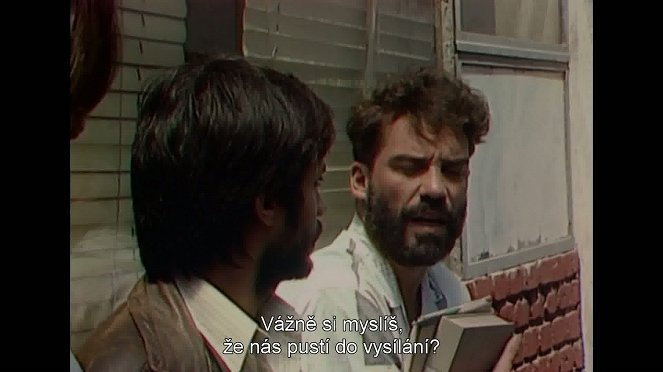Réalisation:
Pablo LarraínPhotographie:
Sergio ArmstrongMusique:
Carlos CabezasActeurs·trices:
Gael García Bernal, Alfredo Castro, Néstor Cantillana, Antonia Zegers, Jaime Vadell, Pablo Krögh, Amparo Noguera, Pedro Peirano, Sergio Hernández (plus)Résumés(1)
Chili, 1988. Lorsque le dictateur chilien Augusto Pinochet, face à la pression internationale, consent à organiser un référendum sur sa présidence, les dirigeants de l'opposition persuadent un jeune et brillant publicitaire, René Saavedra, de concevoir leur campagne. Avec peu de moyens mais des méthodes innovantes, Saavedra et son équipe construisent un plan audacieux pour libérer le pays de l'oppression, malgré la surveillance constante des hommes de Pinochet. (Wild Bunch Distribution)
(plus)Critiques (4)
I’d been looking forward to an historically accurate drama portraying Chile under the leadership of then dictator Pinochet. But I hadn’t expected that this movie would be so accurate that it would also use image to try to transport me to the 1980’s. And truth be told, the historical accuracy was pretty strong. What was worse was the picture, which reminded me of the picture quality in the worst C-list movies from the 1980’s recorded on worn-out VHS tapes, I guess it was supposed to invoke the proper historic atmosphere. So, I can hardly say that the movie wasn’t original, but I do have to admit that I didn’t manage to get used to this manner of storytelling. The skipping of individual scenes and intentional cuts like in the times of the commies might look interesting, but in connection with the accurate historic description of even the slightest fart of an ordinary cleaning lady at the “No” movement, it comes across as rather boring at times.
()
Democracy as a sexy product and Pinochet destroyed, among other things, by free-market marketing rivalry? Despite the detachment of the introduction, for me this film represents an ideal synthesis of retro consistency of Good Night, and Good Luck (whilst noting that thanks to the masterfully meaningful television look, it goes a bit further) and the fun of Frost / Nixon (those collages of spots are fantastic). In addition, thanks to the great Bernal, the intimate plane also works. No is a drama / para-documentary that seamlessly combines records of history and fiction, but it does not do so to convince us that it captures the pure truth of history, but rather to show how our civic experience of truth is always necessarily mediated, truncated and distorted. In the end, luck and people with baguettes in a basket always work best. Good evening.
()
Before the start of the movie, flashy previews of blockbusters with enticing visuals and glossy advertisements appeared on the movie theater screen, which attempted to grab the viewers' attention with short-term effects. Then followed a grainy, blurred image that seemed to come from a TV screen from the 80s or a vintage documentary, and especially in contrast to the previous shots, it appeared as a shabby relative. I still vividly remember the events related to the referendum on Pinochet's stay in office. Practically nobody wanted to believe that with all the power he possessed, he would voluntarily relinquish the government and his convincing victory in the manipulated electoral process was expected. Well, it shows the way the general, who seemingly held all the aces, managed to return from the presidential office back to the barracks. I'm not talking about the undeniable crimes and certainly not the revolutions and protests but about the humor and advertising. Instead of dissidents, Pinochet was escorted by advertising strategists and creative minds. They won the duel against their government competitors because they bet not on fear but on hope. The best ideals, programs, or personalities are not sellable and enforceable without proper advertising. The charismatic Bernal is sidelined here, and the film focuses on processes and events, not on the main character, who is rather a kind of guide and connector. It's a small but interesting film that will be remembered. Overall impression: 90%.
()
Un regard sur les derniers jours de dictature de droite, qui n'a pas réussi à légitimer son système usé et sans perspective, ni vers l'extérieur ni vers l'intérieur, compte tenu de la situation géopolitique mondiale modifiée. Et pourtant, ses fondements étaient malheureusement plus solides qu'il n'y paraissait à première vue. Calme et ordre, travail, trois repas par jour et même la possibilité de payer les études des enfants pour certains, les gens commencent soudainement à tolérer les disparitions, les meurtres, les tortures, etc. La tristesse, dans le cas du Chili, est non seulement cet aspect, mais aussi la manière dont elle a été vaincue (du moins dans le film qui nous a été présenté, qui malheureusement n'est pas loin de la vérité). La démocratie est en réalité amorphe, tout et rien, fonctionnant uniquement sur la base de modèles émotionnels primitifs qui peuvent facilement être manipulés par l'homme. Et quand la démocratie l'emporte ? Alors l'échange commercial revient à l'ordre du jour - contre la prospérité matérielle, la tolérance des inégalités, de la pauvreté, des perspectives gâchées et des potentiels des moins favorisés, etc. C'est pourquoi la conclusion glace même les habitants du "monde libre" - la démocratie est en réalité un produit créé par une agence de publicité (politique)...
()

